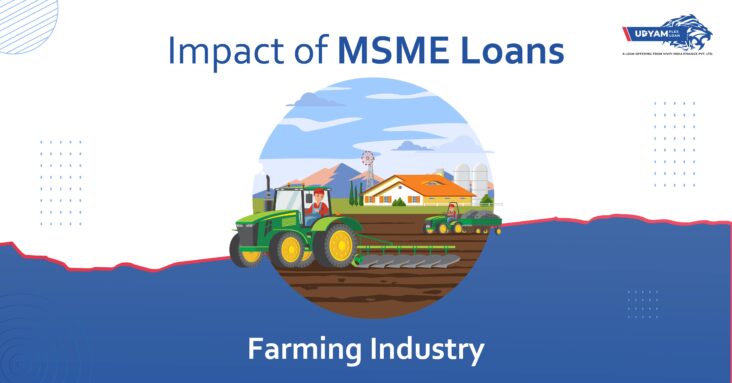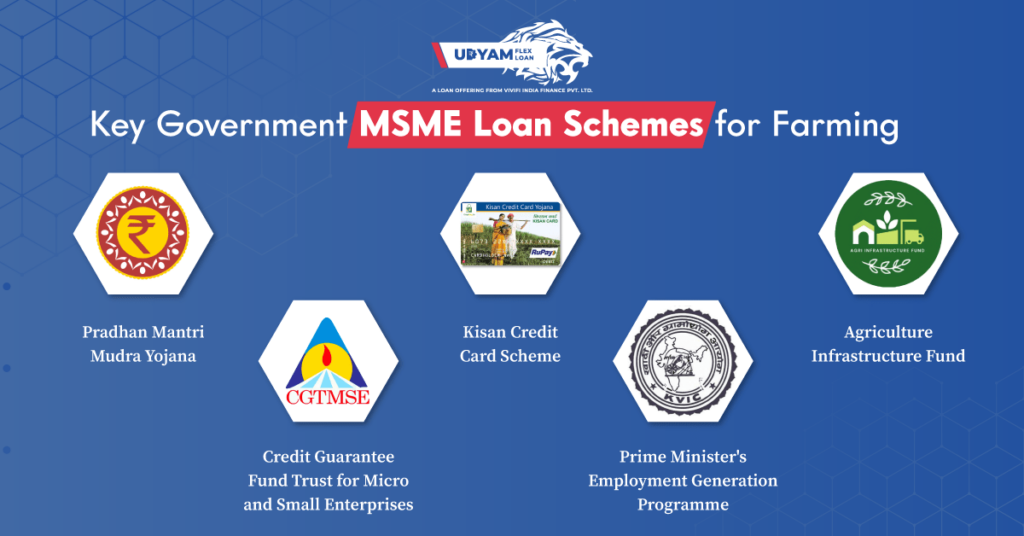The Backbone of Agriculture: Impact of MSME Loans in the Farming Industry

The Micro, Small, and Medium Enterprises (MSME) sector forms the backbone of India’s agricultural landscape. It plays a crucial role in supporting farmers and rural economies. The Indian agricultural sector, a cornerstone of the nation’s economy, has been significantly bolstered by focusing on the government MSME loan schemes. As of 2024, these initiatives continue to play a crucial role in modernizing farming practices, enhancing productivity, and improving rural livelihoods. These contributions are ultimately enhancing food security and rural livelihoods across the nation.
MSME Loan For Farming In India
MSME loans for farming in India have become vital for agricultural development and rural economic growth. These loans provide small and medium-scale farmers with much-needed capital to invest in modern farming techniques, equipment, and technologies. The Indian government, recognizing the importance of this sector, has implemented various schemes to facilitate easier access to credit for farmers.
Key features of MSME loans for farming include lower interest rates, flexible repayment terms, and minimal collateral requirements. The impact of these loans extends beyond individual farmers, contributing to increased agricultural productivity, improved food security, and enhanced rural employment opportunities. As India strives to modernize its agricultural sector, Government MSME loan schemes continue to play a crucial role in empowering farmers and driving sustainable growth in the farming industry.
Also Read: How to get MSME Loan upto 10 Lakhs in Minutes
Importance of MSME Loans in Indian Agriculture
MSME loans have become indispensable for Indian farmers, providing them with the necessary capital to invest in modern farming techniques, equipment, and technologies. As of 2024, the MSME sector contributes approximately 30% to India’s GDP and employs over 110 million people in the agricultural and allied sectors. The Reserve Bank of India reports a 15% year-over-year increase in credit disbursement to agricultural MSMEs, reaching ₹16.3 lakh crore in the fiscal year 2023-24.
Key Government MSME Loan Schemes for Farming
1. Pradhan Mantri Mudra Yojana (PMMY)
The PMMY continues to be a flagship program, offering loans up to ₹10 lakh without collateral. In 2024, the scheme saw a 20% increase in disbursements to the farming sector compared to the previous year. The loans are categorized into:
- Shishu: Loans up to ₹50,000
- Kishore: Loans from ₹50,001 to ₹5 lakh
- Tarun: Loans from ₹5,00,001 to ₹10 lakh
2. Credit Guarantee Fund Trust for Micro and Small Enterprises (CGTMSE)
This scheme provides collateral-free MSME loans for Farming in India. As of 2024, the CGTMSE has extended its coverage to loans up to ₹5 crore, with a special focus on agri-tech startups and innovative farming practices.
3. Prime Minister’s Employment Generation Programme (PMEGP)
The PMEGP offers credit-linked subsidies to set up micro-enterprises, including in the agricultural sector. In 2024, the scheme introduced additional benefits for projects related to organic farming and sustainable agriculture, with subsidies of up to 35% in urban areas and 50% in rural areas.
4. Kisan Credit Card (KCC) Scheme
While not exclusively a Govt MSME Loan Scheme, the KCC scheme has been expanded to cover more MSME activities in agriculture. As of 2024, over 30 million active Kisan Credit Cards are in circulation, with a total credit limit of ₹3.5 lakh crore.
5. Agriculture Infrastructure Fund
Launched in 2020, this Govt MSME Loan Scheme has gained significant traction by 2024. It aims to provide medium to long-term debt financing for investment in viable projects for post-harvest management infrastructure and community farming assets. The fund size has been increased to ₹2 lakh crore, with interest subvention of 3% per annum.
Impact and Success Stories
The implementation of these MSME Loans for Farming has led to remarkable transformations in Indian agriculture. For instance:
- A group of small farmers in Maharashtra utilized the PMEGP scheme to set up a food processing unit, increasing their income by 40% in 2024.
- In Punjab, CGTMSE-backed loans enabled the adoption of precision farming techniques, resulting in a 25% increase in crop yield.
- The Agriculture Infrastructure Fund has facilitated the establishment of over 10,000 farmer-producer organizations (FPOs) by 2024, enhancing market access for small and marginal farmers.
Looking ahead, the government aims to further digitalize the loan application process, integrate more financial technology solutions, and focus on sustainable and climate-resilient agricultural practices through these Govt MSME loan schemes.
Challenges and Future Outlook
Despite the success, challenges remain, including:
- Streamlining the loan application process
- Increasing awareness about these schemes in remote rural areas
- Addressing regional disparities in loan disbursement
Udyam Flex Loan
Udyam Flex Loan is an innovative product that offers credit to MSMEs and beats the challenges any other MSME loans might have. Udyam Flex Loan has a streamlined application process along with minimal documentation. For an MSME business that has a monthly turnover of over INR 30,000 and has been in the market for more than 6 months, this loan is made for your business. Its relaxed eligibility criteria and minimal documentation, encourage agricultural businesses to grow without worrying about capital.
Government MSME loan schemes have proven to be a game-changer for Indian agriculture. As we progress through 2024, these initiatives continue to evolve, addressing the changing needs of farmers and the agricultural sector. By providing accessible finance, these schemes are not just modernizing farming practices but are also contributing significantly to rural development and India’s overall economic growth.

